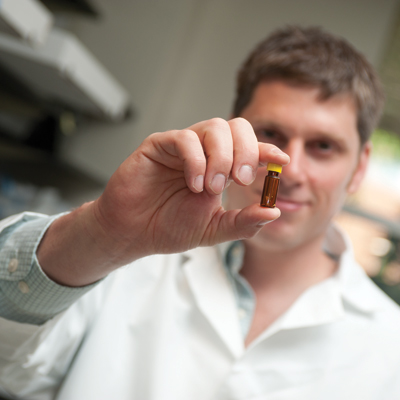Fox-Sponsored Breakthroughs
Grants from the Michael J. Fox Foundation contribute to exploration of Parkinson disease cures and coping strategies.

Jason Cannon is searching for genetic connections between inflammatory disease and Parkinson's.
Nearly 60,000 people are diagnosed with Parkinson's disease each year and many go undiagnosed. Purdue researchers, including Jason Cannon, are searching for clues to find a cure. For those living with the disease, alumna Lorraine Ramig has co-developed a method to give them a stronger voice and to improve swallowing. Both have been aided in their research by grants from the Michael J. Fox Foundation, which the actor launched in 2000 to raise much-needed research funding and awareness for Parkinson's disease.
Finding connections
Cannon, assistant professor of health sciences and toxicology, is searching for genetic connections between inflammatory disease and Parkinson's, a debilitating disease affecting more than 1 million people in the U.S.
Through a $250,000, two-year grant from the Michael J. Fox Foundation, Cannon and his co-principal investigator, Chang Kim, professor of immunology in the College of Veterinary Medicine, will examine a protein called leucine-rich repeat kinase 2 (LRRK2) that is linked to various diseases, including Parkinson's disease. The protein also has been linked to inflammatory bowel diseases like Crohn's and ulcerative colitis.
Discovered in 2004, LRRK2 is the greatest known genetic contributor to Parkinson's disease. Mutations in LRRK2 are the most common genetic cause of the disease representing 1 to 2 percent of all Parkinson's cases.
Recently it has been learned that the protein also plays a role in inflammatory bowel diseases. Because of this link, the Fox Foundation was very interested in funding studies examining LRRK2 in both, Cannon says. "They are very interested in collaborations between neuroscientists and immunologists," he says. "We already have here at Purdue transgenic rat models that express these mutations. Chang Kim is an outstanding immunologist who has expertise in studying inflammatory bowel diseases, particularly Crohn's and ulcerative colitis."
LRRK2 accounts for the highest number of genetic Parkinson's cases but the protein isn't fully penetrant. One may possess the protein but not develop the disease.
"The protein has at least five different functional domains — regions that do different things," Cannon says. "Mutations in a number of these functional domains cause Parkinson's. Finding why some people with the LRRK2 mutation develop disease while others don't is the dilemma."
Some of the earliest benchmarks for the study, which began in November, will see whether there is evidence of inflammation and immune dysfunction in the lab animals at different ages.
Cannon says often Parkinson's researchers focus on the brain but his team's research also will be look at the spleen, intestines, lymph nodes and different tissues to see whether animals that express the mutated protein have immunological alterations in these areas.
"On the other side we will also be utilizing models of inflammatory bowel diseases to see if there is cross talk between them and the brain," Cannon says. "These are very complex diseases and there may be links between them that you would think have nothing to do with each other."











